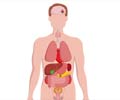A new study has found that two genetic mutations in liver cells may drive the formation of tumors in intrahepatic cholangiocarcinoma (iCCA), the second most common form of liver cancer

iCCA strikes bile ducts, tube-like structures in the liver that carry bile, which is required for the digestion of food. With so much still unknown about the disease, there is no first-line, standard of care and no successful therapies.
"iCCA is resistant to standard treatments like chemotherapy and radiation," said Josep Maria Llovet, MD, Director of the Liver Cancer Program, Division of Medicine, Icahn School of Medicine at Mount Sinai, and contributing author. "Understanding the molecular mechanism of the disease is the key to finding a treatment that works."
Dr. Llovet and colleagues demonstrated that the expression of mutant IDH in the adult liver of genetically engineered mice impairs liver cell development and liver regeneration – a process in which the liver responds to injury – and increases the number of cells to form a tumor. Moreover, mutant IDH were found to work with activated KRAS, a gene essential in cancer development, causing the development of premalignant lesions and a progression to metastatic iCCA.
"Our findings provide novel insights into the development iCCA and offers a possible treatment option for patients suffering from this fatal disease," said Dr. Llovet.
By pinpointing one pathway of iCCA, this study opens up a new line of investigation to identify biomarkers of the disease. Already, Phase 1 clinical trials are being conducted with specific IDH1/2 mutations. The hope is that results of these and future studies can help doctors make life-saving decisions for their patients.
Advertisement
Source-Eurekalert













